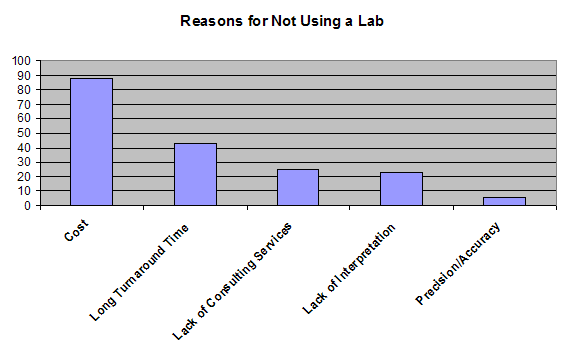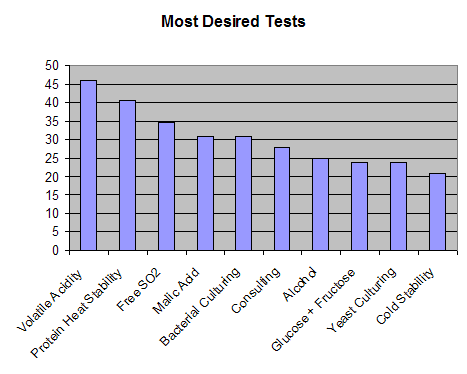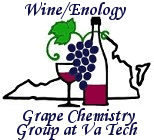Enology Notes
Enology Notes #124, January 24, 2007
To: Regional Wine Producers
From: Bruce Zoecklein, Head, Enology-Grape Chemistry Group, Virginia Tech
Subject: Virginia Tech’s Enology Service Laboratory; Winery Planning and Design Workshop; VVA Winter Meeting Highlighting Cabernet franc and Petit Manseng; New Version of Winery Planning CD Available
1. Virginia Tech’s Enology Service Laboratory. From our Fall 2006 survey of 217 wineries in five states, the reasons given for not using any commercial service laboratories, in order of response, were:
- Cost
- Turnaround Time
- Lack of Consulting Services
- Lack of Interpretation
- Precision/Accuracy

The top 5 desired tests to be conducted by a lab were:
- Volatile Acidity
- Heat Stability
- Sulfites
- Malic Acid
- Bacterial Culturing

The economics of using service labs relative to winery investment was discussed in Enology Notes #123. I will now discuss the rest of the results listed above.
Of the top desired tests, Heat Stability and Bacterial Culturing have a time component that cannot be changed. The turnaround time for Volatile Acidity, Sulfites, and Malic Acid Analysis is strictly a function of methods and equipment employed by the commercial service laboratory.
To this end, the Virginia Tech Enology Service Lab has made a significant investment in equipment to automate and expedite the analysis of Volatile Acidity, Sulfites, Malic and Lactic Acids, Alcohol, and Fermentable Sugars. Our turnaround time for these analyses has gone from hours per sample to minutes, while retaining the accuracy and use of standard methods and allowing optimum precision.
For the Virginia Tech Enology Service Lab, the majority of analysis results are posted within 8 hours from the time samples are received. Interpretation and explanation of results is included with every analysis, and each type of analysis is linked to the Enology Notes catalog.
Virginia Tech’s Enology Analytical Services Laboratory offers Heat Stability analysis, along with Cold Stability and Fining Trials. Although these analyses increase turnaround time due to their inherent time components, these analyses allow us to offer some consulting pre-bottling for the optimum presentation of the wine in the bottle.
Along with Bacterial Culturing, the service lab offers Yeast Culturing and Sterility Check/Culturing to wineries, to help prevent anomalous microorganism growth down the line.
We would like to thank those who responded to the survey. If you have not respond yet, the survey can be filled out online, or printed and mailed from the website www.vtwines.info, under Lab Analysis Survey. – Ken Hurley,
2. Winery Planning and Design Workshop. A Winery Planning and Design Workshop is scheduled for March 5, 2007 in King of Prussia, PA, one day prior to the start of this year’s Wineries Unlimited program. The Valley Forge Convention Center is just outside of Philadelphia. Registration information is available at www.wineriesunlimited.com.
The direct association between the making of wine and the buildings that house it goes back to the late 18th century, when winemakers in the Bordeaux region of France began using the word ‘chateau’ on the labels themselves. Today, wineries must be more than processing facilities. They should have architectural merit, be energy efficient and support the brand image.
This Winery Planning and Design Workshop includes selected consultants, California-based winery architects and planners, and will involve the following:
Winery Design
- Winery Design Considerations
- Winery Layout
Winery Equipment
- Equipment Considerations
- Equipping a Small Winery
- Fermentation and Storage Vessel Considerations
- Wine Caves
- Gravity Flow Winery Designs
Examples of Winery Designs
- Winery Architecture
- Winery Designs, Case Studies, and Winery Tasting Room Design
Wastewater Treatment
Also included: winery business planning, winery economics, and refrigeration.
For registration information, see http://www.wineriesunlimited.com.
Please note: Pre-registration deadline is Monday, February 26.
Please note: The Winery Planning CD (see below) is NOT included with registration. A hard copy manual specific to the course topics will be provided.
3. VVA Winter Meeting. The Winter Meeting of the Virginia Vineyards Association is scheduled for February 8-10, 2007 at the Omni Hotel, Charlottesville. This year, it will feature two interesting grape varieties, Petit Manseng and Cabernet franc.
Winemakers are aware that wine flavors have many contributing elements. What is not well understood is that the grape carries an aroma, flavor and structural quotient that relates to its herbaceous and vegetative origin, and how to best manage that potential to produce a balanced wine.
VVA program details and registration information are available at http://virginiavineyardsassociation.com.
4. New Edition of Winery Planning and Design CD Available. Edition 12 of the Enology-Grape Chemistry Group’s comprehensive 200-page review covers the essential planning and design considerations of critical importance in winery establishment. The Winery Planning and Design CD is available through Practical Winery and Vineyard magazine. Email them at , or call (415) 479-5819.
![]()
Subscription to Enology Notes. All past Enology Notes newsjournals are posted on the Enology-Grape Chemistry Group's web site at: http://www.vtwines.info/.
To be added to (or removed from) the Enology Notes listserve send an email message to with the word "ADD" or "REMOVE" in the subject line.
Dr. Bruce
Zoecklein
Professor and Enology Specialist Head Enology-Grape Chemistry Group
Department of Food Science and Technology, Virginia Tech
Blacksburg VA 24061
Enology-Grape Chemistry Group Web address: http://www.vtwines.info/
Phone: (540) 231-5325
Fax: (540) 231-9293
Cell phone: 540-998-9025
Email:
